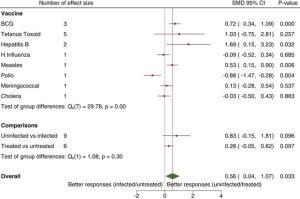Helminths are highly prevalent in settings with high burden of vaccine preventable diseases. Due to this, parasites including helminths have long been proposed as modulators of vaccine responses. In a recent systematic review (Natukunda et al, 2022), researchers systematically reviewed existing literature on the effects of helminth infections and their treatment on vaccine responses in humans and animals. Using medical subject heading and key word terms, they searched 4 databases (Medline, EMBASE, Global health, Scopus, and Web of science) for WHO licensed vaccines and helminths infection/treatment search concepts.
Of the 4402 articles identified, 37 were included in the review of human studies and 24 for animal experiments. For human studies, regardless of vaccine type, overall Standard Mean Difference for helminth uninfected/treated, compared to infected/untreated, was 0.56 (95% CI 0.04–1.07 and I2 = 93.5%) for direct helminth exposure and 0.01 (95% CI −0.04 to 0.07 and I2 = 85.9%) for prenatal helminth exposure. For animal studies, the most affected vaccine was BCG.

Figure 1: Forest plot of the effect of direct helminth infection or anthelminthic treatment on vaccine responses.
From this systematic review, they concluded that helminth-associated impairment of vaccine responses is more severe for direct, than for prenatal, helminth exposure.
Journal article: Natukunda A, et al., 2022. The effect of helminth infection on vaccine responses in humans and animal models: A systematic review and meta‐analysis. Parasite Immunology.
Summary by Ludoviko Zirimenya










